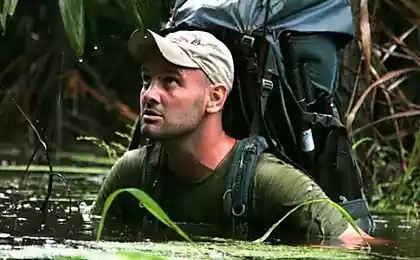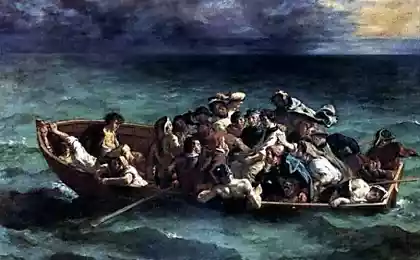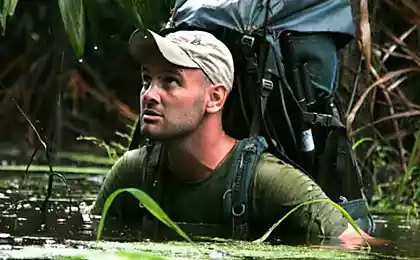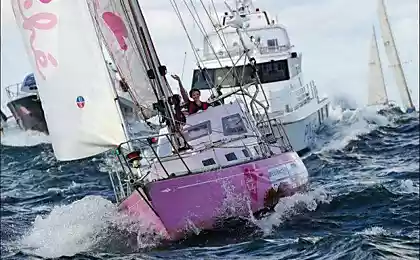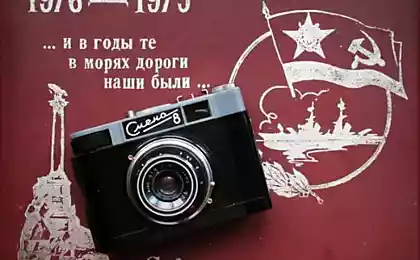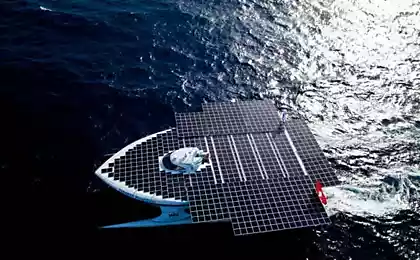1284
Solo Voyage
After a 49-day drift in the Pacific Haggard Soviet soldiers said American sailors: we only need fuel and food, and to the house we doplyvёm themselves.
via
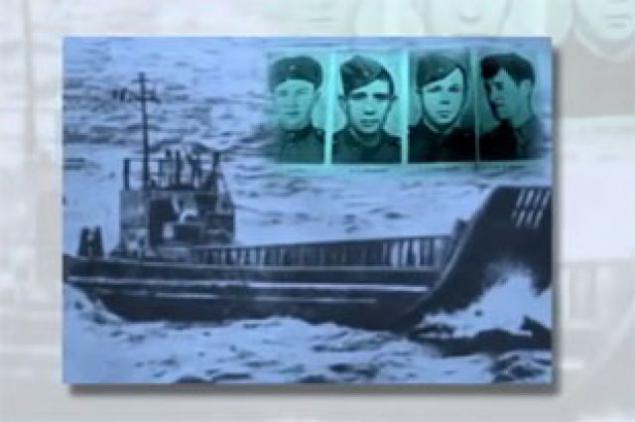
"Heroes are not born, become heroes" - this wisdom is the best suited to the history of Soviet foursome lads that shook the world in the spring of 1960.
Young children are not eager for glory and fame, not dreaming about the exploits just one life they faced a choice: to become heroes or die.
January 1960, the island of Etorofu, one of the island's most Southern Kuril chain, which to this day dreaming Japanese neighbors.
Because of the rocky shoals delivery of goods to the island of ships is extremely difficult, and therefore the function of a transit point, "floating jetty" at the island served as a self-propelled tank landing barge T-36.
Over formidable phrase "tank landing barge" hiding small boat hundred tons displacement, waterline length was 17 meters, width - three and a half meters, draft - a little more than a meter. The maximum speed of the barge was 9 knots, and away from the shore without risk, the T-36 could have no more than 300 meters.
However, for those functions that are performed for barge Iturup, it is good enough. Unless, of course, the sea was not a storm.
A January 17, 1960 the element was played in earnest. About 9 o'clock in the morning the wind reached 60 meters per second, plucked from a barge mooring and began to blow it into the open sea.
Those who remained on shore, could only observe the desperate struggle waged with the angry sea of people who were on board the barge. Soon T-36 disappeared from sight ...
When the storm died down, start the search. On the shore were found some things from the barge, and military commanders concluded that the barge is on with her people perished.
On board the T-36 at the time of her disappearance were four soldiers: 21-year-old junior sergeant Askhat Ziganshin, 21-year-old soldier Anatoly Kryuchkovsky, 20-year-old soldier Philip Poplawski and another soldier, 20-year-old Ivan Fedotov.
Native soldier said: their loved ones missing in the performance of military duty. But for apartments still under surveillance, suddenly someone from the missing should not perish, but simply deserted?
But most guys colleagues believed that the soldiers perished in the depths of the ocean ...
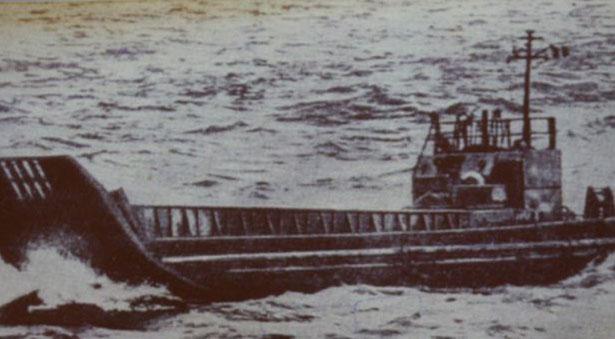
Four, to be aboard the T-36, for ten hours struggling with the elements, until the storm died down. The struggle for survival went all scarce fuel, 15-meter waves was battered barge. Now it just blows farther and farther into the open ocean.
Ziganshin sergeant and his comrades were not sailors - they were in the construction and engineering troops, which in slang called "construction battalion».
They were sent on a barge to unload a cargo ship that is about to be approached. But the hurricane decided otherwise ...
The situation in which the soldiers were looked almost hopeless. Fuel from the barge is gone, there is no communication with the shore, in the hold of a leak, not to mention the fact that the T-36 is not suitable for such "journeys».
From the food on the barge were a loaf of bread, two cans of corned beef, fat bank and a few spoonfuls of cereal. There were two more buckets of potatoes, which during a storm scattered in the engine room, why she was soaked with fuel oil. Capsized and scuttlebutt that partially mixed with sea. More on the ship was small stoves, matches and a few packs of "Belomor».
The fate of the allegedly taunted them: when the storm subsided, Askhat Ziganshin found in the wheelhouse of the newspaper "Red Star", which said that just in the area where they were carried away, to be held the training missile launches, in connection with which the entire area was declared unsafe for navigation.
Soldiers concluded: look for them in this direction, no one is going to end rocket launches. Hence, it is necessary to hold out until their closure.
Fresh water was taken from the engine cooling system - rusty, but fit for consumption. Also collects rainwater. As the food cooked mess of pottage - a little stew, steam smelling fuel potatoes, most a little cereal.
On such a diet is needed not only to survive themselves, but also the struggle for survival of the barge, ice shear off from the sides to prevent its revolution, pumping water is collected in the bilge.
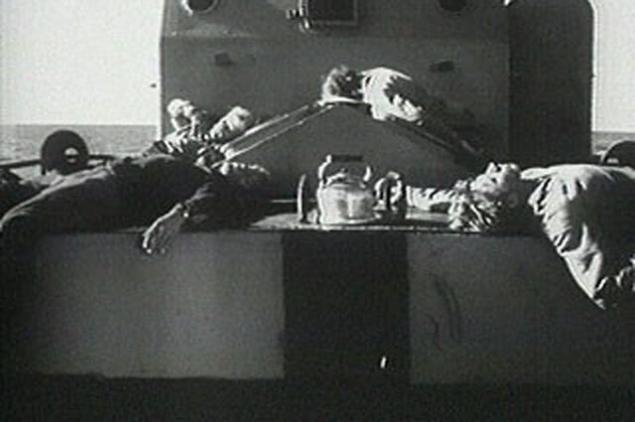
Slept on a wide bed, which they themselves have built and - hugging each other warmly cherished.
The soldiers did not know what for, carry them farther and farther from home, was called "over the death." They tried not to think about the worst, because these thoughts could easily fall into despair.
Day after day, week after week ... food and water are fewer. Once Ziganshin sergeant remembered the story of a school teacher sailors in distress and suffering from hunger. Those sailors cooked and ate leather things. Sergeant leather strap was.
First cooked, crumbled into noodles, belt, then strap on the broken and broken radios, then began to have boots, skinned and eaten with the skin to be aboard the accordion ...
With the water situation was very bad. Also mess of pottage, her battered each sip. Once in two days.
Last potatoes cooked and ate on February 23 in the Soviet Army Day. By that time, to the pangs of hunger and thirst were added auditory hallucinations. Ivan Fedotov began torturing terror attacks. Comrades supported him as best they could, reassuring.
For all the time drift of the four have been no quarrel, no conflict. Even when the forces are already almost gone, not one tried to grab fellow food or water to survive himself. Just agreed: the last person left alive, before I die, leave the barge record of how the crew perished T-36 ...
March 2, they first saw the passing away ship, but it seems do not believe in what to them is not a mirage. March 6 new ship appeared on the horizon, but the signals are desperate for help, which served the soldiers on it is not noticed.
March 7, 1960 Air Group with the US aircraft carrier "Kearsarge" discovered barge T-36, about a thousand miles northwest of Midway Island. Waterlogged barge, which should not be removed from the shore for a distance greater than 300 meters, took place more than a thousand miles across the Pacific, breaking half the distance from the Kuril Islands to Hawaii.
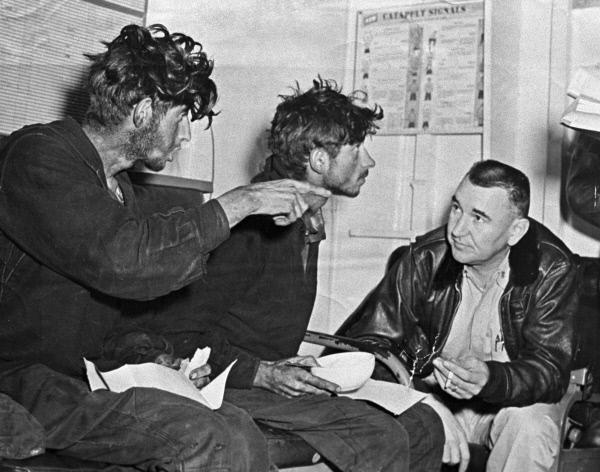
Americans in the first few minutes does not understand that, in fact, a miracle before them and what kind of people are floating on it?
But an even bigger shock sailors from the aircraft carrier survived when delivered from a barge helicopter Ziganshin sergeant said: we all normally need fuel and food, and we ourselves doplyvёm home.
In fact, of course, has nowhere to swim soldiers could not. How then doctors say, live quartet was not much: death from exhaustion could occur in the next few hours. A T-36 by the time there was one of boots and three matches.
American doctors were amazed at not only the stability of the Soviet soldiers, but also the amazing self-discipline: when the crew of the aircraft carrier began offering them food, they ate quite a bit and stopped. They eat more at once would have died, as many died, survived a long famine.
On board the aircraft carrier, when it became clear that they were saved, the forces finally left the soldiers - Ziganshin asked for a razor, but fainted near the sink. Shave him and his fellow sailors had "Kearsarge».
When the soldiers sleep off their fear began to torment of a different kind - the yard was a cold war, and they were not helping anyone, and "potential adversary." In addition to the Americans came across the Soviet barge.
Captain "Kearsarge", by the way, could not grasp why the soldiers were so zealously require him to immerse aboard the aircraft carrier is a rusty trough? To appease them, he told them: barge towed to the port of another vessel.
In fact, the Americans sank T-36 - not out of a desire to harm the Soviet Union, but because he was a threat waterlogged barge navigation.
To the credit of the US military, in relation to the Soviet soldiers, they behaved very decently. Nobody racked their inquiries and interrogations, more than that, to the cabin, where they lived, put protection - not to bother curious.
But the soldiers worried that they will say in Moscow. And Moscow, receiving news from the US, some time silent. And this is understandable: in the Soviet Union waited not ask whether the saved asylum in America, that their statements are not to be trapped.
When it became clear that the military is not going to "freedom to choose", about the Quartet feat Ziganshin talking on television, radio and in newspapers, and himself, Soviet leader Nikita Khrushchev sent them a telegram of greetings.
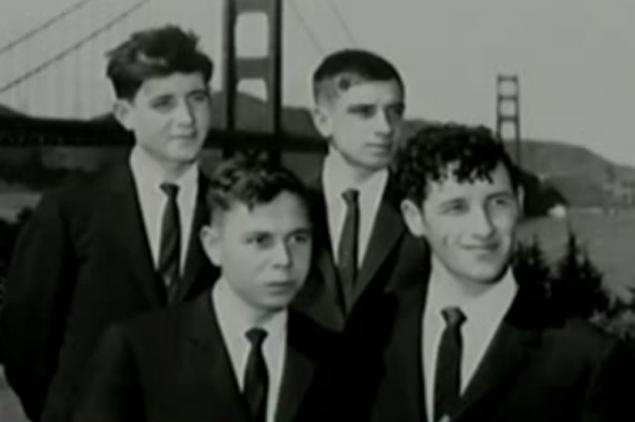
The first press conference was held more heroes on the aircraft carrier where helicopters brought about fifty journalists. It had to finish ahead of time: at Askhat Ziganshin nose bled.
Later, the guys have given a lot of press conferences, and virtually everywhere asked the same question:
- How to taste boots?
"The skin is very bitter, with an unpleasant odor. But is time to taste it? I wanted only one thing: to trick the stomach. But just do not eat the skin, too rigid. So we cut to small pieces and burned. When tarpaulin burned, it turns into something similar to charcoal and becomes soft. This "delicacy" we smeared with grease to make it easier to swallow. Several of these "sandwiches" and make up our daily diet, "- later recalled Anatoly Kryuchkovsky.
At home the same question asked students. "Sami try" - joked somehow Philip Poplawski. I wonder how many boots cooked after this boy experimenters in the 1960s?
By the time of arrival of the aircraft carrier in San Francisco heroes unique voyage lasted, according to the official version, 49 days already matured a bit. America met them enthusiastically - Mayor of San Francisco gave them a "golden key" from the city.
Soldier welcoming hosts dressed in costumes of the latest fashion and Americans fell in love with Russian characters. Photographs taken at the time, they really look great - neither give nor take "the Liverpool quartet».
Specialists admired: the young Soviet guys in a critical situation is not lost human form, not brutalized, without conflict, not rolled up to cannibalism, as has happened with many of those who fall into similar circumstances.
A simple US residents looking at the photo, wondering, is this enemy? Charming little guys a bit shy, which only adds to their charm. In general, for the image of the Soviet Union four soldiers during his stay in the United States have done more than all the diplomats.
Incidentally, with regard to comparisons with the "Fab Four" - Ziganshin teammates did not sing, but in the history of Russian music have left a trace by using a composition titled "Ziganshin-Boogie».
Domestic dudes, now sung in the movie, created a song to the tune «Rock Around the Clock», devoted to the drift of the T-36:
As the Pacific
Sinking barge with dudes.
Dudes do not lose heart,
Rock on deck throw.
Ziganshin rock, boogie-Ziganshin,
Ziganshin - the guy from Kaluga,
Ziganshin-boogie-rock Ziganshin,
Ziganshin ate his boots.
Poplawski rock, boogie-Poplawski,
Poplawski ate letter girlfriend,
While Poplawski teeth bared,
Ziganshin ate his sandals.
Days float, float week,
The vessel is on the waves,
Boots already in soup eaten
And with an accordion in half ...
Of course, writing such masterpieces is much easier than to survive in such conditions. But modern directors dudes closer.
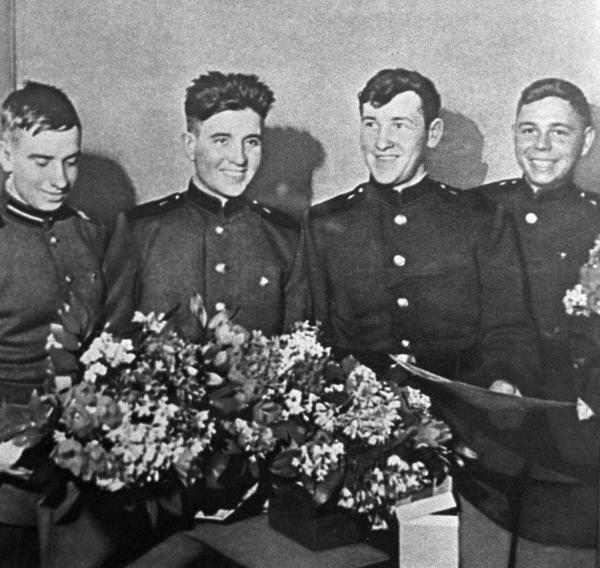
Upon returning to the USSR heroes welcome awaited summit - in their honor was organized rally soldiers personally took Nikita Khrushchev and Defense Minister Rodion Malinovsky.
All four were awarded the Order of the Red Star, about their voyage made a film, written a few books ...
Popularity foursome with barge T-36 start to go until the end of 1960.
Shortly after returning home soldiers demobilized Rodion Malinovsky noticed that guys have served their full.
Philip Poplawski, Anatoly Kryuchkovsky and Askhat Ziganshin on the recommendation of the command entered the Leningrad Naval technical secondary school, from which he graduated in 1964.
Ivan Fedotov, the guy from the banks of the Amur River, returned home and worked all his life Rechnik. He died in 2000.
Philip Poplawski, who settled near Leningrad, after graduating from college he worked on large vessels, go on international voyages. He died in 2001.
Anatoly Kryuchkovsky lives in Kiev, worked for many years as deputy chief mechanic at the Kiev factory "Lenin's smithy».
Askhat Ziganshin after graduation entered Mechanical rescue squad in the town of Lomonosov Leningrad, married, raised two beautiful daughters. After retirement, he settled in St. Petersburg.
They are not eager for fame and do not worry, when the glory of touching them for a few years, disappeared as if it never was.
But heroes they remain forever.
PS According to the official version, as already mentioned, the drift of the T-36 lasted 49 days. However, a reconciliation of dates gives a different result - 51 days. There are several explanations for this incident. According to the most popular, about the "49 days" said the first Soviet leader Nikita Khrushchev. Sounded data they officially decided not to challenge anybody.
Everything.
via

"Heroes are not born, become heroes" - this wisdom is the best suited to the history of Soviet foursome lads that shook the world in the spring of 1960.
Young children are not eager for glory and fame, not dreaming about the exploits just one life they faced a choice: to become heroes or die.
January 1960, the island of Etorofu, one of the island's most Southern Kuril chain, which to this day dreaming Japanese neighbors.
Because of the rocky shoals delivery of goods to the island of ships is extremely difficult, and therefore the function of a transit point, "floating jetty" at the island served as a self-propelled tank landing barge T-36.
Over formidable phrase "tank landing barge" hiding small boat hundred tons displacement, waterline length was 17 meters, width - three and a half meters, draft - a little more than a meter. The maximum speed of the barge was 9 knots, and away from the shore without risk, the T-36 could have no more than 300 meters.
However, for those functions that are performed for barge Iturup, it is good enough. Unless, of course, the sea was not a storm.
A January 17, 1960 the element was played in earnest. About 9 o'clock in the morning the wind reached 60 meters per second, plucked from a barge mooring and began to blow it into the open sea.
Those who remained on shore, could only observe the desperate struggle waged with the angry sea of people who were on board the barge. Soon T-36 disappeared from sight ...
When the storm died down, start the search. On the shore were found some things from the barge, and military commanders concluded that the barge is on with her people perished.
On board the T-36 at the time of her disappearance were four soldiers: 21-year-old junior sergeant Askhat Ziganshin, 21-year-old soldier Anatoly Kryuchkovsky, 20-year-old soldier Philip Poplawski and another soldier, 20-year-old Ivan Fedotov.
Native soldier said: their loved ones missing in the performance of military duty. But for apartments still under surveillance, suddenly someone from the missing should not perish, but simply deserted?
But most guys colleagues believed that the soldiers perished in the depths of the ocean ...

Four, to be aboard the T-36, for ten hours struggling with the elements, until the storm died down. The struggle for survival went all scarce fuel, 15-meter waves was battered barge. Now it just blows farther and farther into the open ocean.
Ziganshin sergeant and his comrades were not sailors - they were in the construction and engineering troops, which in slang called "construction battalion».
They were sent on a barge to unload a cargo ship that is about to be approached. But the hurricane decided otherwise ...
The situation in which the soldiers were looked almost hopeless. Fuel from the barge is gone, there is no communication with the shore, in the hold of a leak, not to mention the fact that the T-36 is not suitable for such "journeys».
From the food on the barge were a loaf of bread, two cans of corned beef, fat bank and a few spoonfuls of cereal. There were two more buckets of potatoes, which during a storm scattered in the engine room, why she was soaked with fuel oil. Capsized and scuttlebutt that partially mixed with sea. More on the ship was small stoves, matches and a few packs of "Belomor».
The fate of the allegedly taunted them: when the storm subsided, Askhat Ziganshin found in the wheelhouse of the newspaper "Red Star", which said that just in the area where they were carried away, to be held the training missile launches, in connection with which the entire area was declared unsafe for navigation.
Soldiers concluded: look for them in this direction, no one is going to end rocket launches. Hence, it is necessary to hold out until their closure.
Fresh water was taken from the engine cooling system - rusty, but fit for consumption. Also collects rainwater. As the food cooked mess of pottage - a little stew, steam smelling fuel potatoes, most a little cereal.
On such a diet is needed not only to survive themselves, but also the struggle for survival of the barge, ice shear off from the sides to prevent its revolution, pumping water is collected in the bilge.

Slept on a wide bed, which they themselves have built and - hugging each other warmly cherished.
The soldiers did not know what for, carry them farther and farther from home, was called "over the death." They tried not to think about the worst, because these thoughts could easily fall into despair.
Day after day, week after week ... food and water are fewer. Once Ziganshin sergeant remembered the story of a school teacher sailors in distress and suffering from hunger. Those sailors cooked and ate leather things. Sergeant leather strap was.
First cooked, crumbled into noodles, belt, then strap on the broken and broken radios, then began to have boots, skinned and eaten with the skin to be aboard the accordion ...
With the water situation was very bad. Also mess of pottage, her battered each sip. Once in two days.
Last potatoes cooked and ate on February 23 in the Soviet Army Day. By that time, to the pangs of hunger and thirst were added auditory hallucinations. Ivan Fedotov began torturing terror attacks. Comrades supported him as best they could, reassuring.
For all the time drift of the four have been no quarrel, no conflict. Even when the forces are already almost gone, not one tried to grab fellow food or water to survive himself. Just agreed: the last person left alive, before I die, leave the barge record of how the crew perished T-36 ...
March 2, they first saw the passing away ship, but it seems do not believe in what to them is not a mirage. March 6 new ship appeared on the horizon, but the signals are desperate for help, which served the soldiers on it is not noticed.
March 7, 1960 Air Group with the US aircraft carrier "Kearsarge" discovered barge T-36, about a thousand miles northwest of Midway Island. Waterlogged barge, which should not be removed from the shore for a distance greater than 300 meters, took place more than a thousand miles across the Pacific, breaking half the distance from the Kuril Islands to Hawaii.

Americans in the first few minutes does not understand that, in fact, a miracle before them and what kind of people are floating on it?
But an even bigger shock sailors from the aircraft carrier survived when delivered from a barge helicopter Ziganshin sergeant said: we all normally need fuel and food, and we ourselves doplyvёm home.
In fact, of course, has nowhere to swim soldiers could not. How then doctors say, live quartet was not much: death from exhaustion could occur in the next few hours. A T-36 by the time there was one of boots and three matches.
American doctors were amazed at not only the stability of the Soviet soldiers, but also the amazing self-discipline: when the crew of the aircraft carrier began offering them food, they ate quite a bit and stopped. They eat more at once would have died, as many died, survived a long famine.
On board the aircraft carrier, when it became clear that they were saved, the forces finally left the soldiers - Ziganshin asked for a razor, but fainted near the sink. Shave him and his fellow sailors had "Kearsarge».
When the soldiers sleep off their fear began to torment of a different kind - the yard was a cold war, and they were not helping anyone, and "potential adversary." In addition to the Americans came across the Soviet barge.
Captain "Kearsarge", by the way, could not grasp why the soldiers were so zealously require him to immerse aboard the aircraft carrier is a rusty trough? To appease them, he told them: barge towed to the port of another vessel.
In fact, the Americans sank T-36 - not out of a desire to harm the Soviet Union, but because he was a threat waterlogged barge navigation.
To the credit of the US military, in relation to the Soviet soldiers, they behaved very decently. Nobody racked their inquiries and interrogations, more than that, to the cabin, where they lived, put protection - not to bother curious.
But the soldiers worried that they will say in Moscow. And Moscow, receiving news from the US, some time silent. And this is understandable: in the Soviet Union waited not ask whether the saved asylum in America, that their statements are not to be trapped.
When it became clear that the military is not going to "freedom to choose", about the Quartet feat Ziganshin talking on television, radio and in newspapers, and himself, Soviet leader Nikita Khrushchev sent them a telegram of greetings.

The first press conference was held more heroes on the aircraft carrier where helicopters brought about fifty journalists. It had to finish ahead of time: at Askhat Ziganshin nose bled.
Later, the guys have given a lot of press conferences, and virtually everywhere asked the same question:
- How to taste boots?
"The skin is very bitter, with an unpleasant odor. But is time to taste it? I wanted only one thing: to trick the stomach. But just do not eat the skin, too rigid. So we cut to small pieces and burned. When tarpaulin burned, it turns into something similar to charcoal and becomes soft. This "delicacy" we smeared with grease to make it easier to swallow. Several of these "sandwiches" and make up our daily diet, "- later recalled Anatoly Kryuchkovsky.
At home the same question asked students. "Sami try" - joked somehow Philip Poplawski. I wonder how many boots cooked after this boy experimenters in the 1960s?
By the time of arrival of the aircraft carrier in San Francisco heroes unique voyage lasted, according to the official version, 49 days already matured a bit. America met them enthusiastically - Mayor of San Francisco gave them a "golden key" from the city.
Soldier welcoming hosts dressed in costumes of the latest fashion and Americans fell in love with Russian characters. Photographs taken at the time, they really look great - neither give nor take "the Liverpool quartet».
Specialists admired: the young Soviet guys in a critical situation is not lost human form, not brutalized, without conflict, not rolled up to cannibalism, as has happened with many of those who fall into similar circumstances.
A simple US residents looking at the photo, wondering, is this enemy? Charming little guys a bit shy, which only adds to their charm. In general, for the image of the Soviet Union four soldiers during his stay in the United States have done more than all the diplomats.
Incidentally, with regard to comparisons with the "Fab Four" - Ziganshin teammates did not sing, but in the history of Russian music have left a trace by using a composition titled "Ziganshin-Boogie».
Domestic dudes, now sung in the movie, created a song to the tune «Rock Around the Clock», devoted to the drift of the T-36:
As the Pacific
Sinking barge with dudes.
Dudes do not lose heart,
Rock on deck throw.
Ziganshin rock, boogie-Ziganshin,
Ziganshin - the guy from Kaluga,
Ziganshin-boogie-rock Ziganshin,
Ziganshin ate his boots.
Poplawski rock, boogie-Poplawski,
Poplawski ate letter girlfriend,
While Poplawski teeth bared,
Ziganshin ate his sandals.
Days float, float week,
The vessel is on the waves,
Boots already in soup eaten
And with an accordion in half ...
Of course, writing such masterpieces is much easier than to survive in such conditions. But modern directors dudes closer.

Upon returning to the USSR heroes welcome awaited summit - in their honor was organized rally soldiers personally took Nikita Khrushchev and Defense Minister Rodion Malinovsky.
All four were awarded the Order of the Red Star, about their voyage made a film, written a few books ...
Popularity foursome with barge T-36 start to go until the end of 1960.
Shortly after returning home soldiers demobilized Rodion Malinovsky noticed that guys have served their full.
Philip Poplawski, Anatoly Kryuchkovsky and Askhat Ziganshin on the recommendation of the command entered the Leningrad Naval technical secondary school, from which he graduated in 1964.
Ivan Fedotov, the guy from the banks of the Amur River, returned home and worked all his life Rechnik. He died in 2000.
Philip Poplawski, who settled near Leningrad, after graduating from college he worked on large vessels, go on international voyages. He died in 2001.
Anatoly Kryuchkovsky lives in Kiev, worked for many years as deputy chief mechanic at the Kiev factory "Lenin's smithy».
Askhat Ziganshin after graduation entered Mechanical rescue squad in the town of Lomonosov Leningrad, married, raised two beautiful daughters. After retirement, he settled in St. Petersburg.
They are not eager for fame and do not worry, when the glory of touching them for a few years, disappeared as if it never was.
But heroes they remain forever.
PS According to the official version, as already mentioned, the drift of the T-36 lasted 49 days. However, a reconciliation of dates gives a different result - 51 days. There are several explanations for this incident. According to the most popular, about the "49 days" said the first Soviet leader Nikita Khrushchev. Sounded data they officially decided not to challenge anybody.
Everything.
